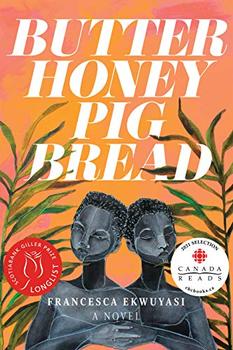Summary | Excerpt | Reviews | Beyond the Book | Read-Alikes | Genres & Themes | Author Bio

This article relates to Butter Honey Pig Bread
.jpg) Agege (pronounced "a-GAY-gay") bread is a sweet white bread known for its unique soft and dense texture. It is a common food in Nigeria, particularly in Lagos, where it is produced by local bakeries and sold by vendors on the streets. In Butter Honey Pig Bread by Francesca Ekwuyasi, Taiye attempts to master baking Agege bread, but finds that her version fails compared to "the particularly dense and stretchy texture of the loaves she buys from the hawkers" in Obalende, a neighborhood in Lagos.
Agege (pronounced "a-GAY-gay") bread is a sweet white bread known for its unique soft and dense texture. It is a common food in Nigeria, particularly in Lagos, where it is produced by local bakeries and sold by vendors on the streets. In Butter Honey Pig Bread by Francesca Ekwuyasi, Taiye attempts to master baking Agege bread, but finds that her version fails compared to "the particularly dense and stretchy texture of the loaves she buys from the hawkers" in Obalende, a neighborhood in Lagos.
Industrialized baking was introduced to Nigeria by Amos Shackleford, a Jamaican entrepreneur known as the "Bread King," who in 1913 began a bread business that would expand into a widespread empire. Immigrants from the West Indies like Shackleford (many of whom were former slaves or their descendants) regularized the production of bread in Nigeria. Shackleford's company distributed its products to various locations, including Agege, a suburb of Lagos. Distribution was interrupted during the transition to Nigerian independence in 1960, and shortly thereafter, the production of "Agege bread" began at a bakery opened by Alhaji Ayokunnu in the area.
As a staple food, Agege bread is valued for its relatively long shelf life. It is often served with eggs and prepared as a breakfast food but may also simply be eaten with butter and in a variety of other ways. When Taiye finally manages to bake a satisfactory Agege bread, she uses it to make a chicken sandwich for her mother. The bread is known for its signature four-cornered shape, which results from being baked in a covered pan. As the cover prevents the bread from rising above the top of the pan, the loaf remains in the form of a square. Ingredients in Agege bread can differ but generally include flour, yeast, sugar, salt, oil or butter, and a dough conditioner or "bread improver" to strengthen the bread and give it the stretchier texture that Taiye desires.
Potassium bromate, a cheap and popular dough conditioner, is banned in Nigeria as well as many other countries (though it is legal in others, including the United States) because it has been shown to cause cancer in laboratory animals, but it is still sometimes used in the making of Agege bread. In Fresh Agege Bread, a documentary by Chika Okoli that explores the past and current role of Agege bread in Nigerian society, the filmmakers bring some bread purchased on the street to a lab to be tested for potassium bromate and find that the levels violate legal standards.
Taiye eventually achieves the right texture for her Agege bread "without the need for potassium bromate, or any other dodgy preservatives" by combining bread flour with boiling water to create scalded flour for a natural dough conditioner. The scalded flour technique is used in Scandinavian and Asian baking as a way of heating up the starch in the flour to give it a more gelatinous quality before adding it to the bread mixture. Some home cooking sites that share tips for making Agege bread, like Nigerian Food TV, also recommend using the tangzhong method, a technique with Japanese origins that was popularized by Taiwanese cookbook author Yvonne Chen and involves pre-cooking a small amount of flour with liquid. Yewande Komolafe's New York Times Agege bread recipe calls for warm water or milk but does not require any dough enhancement additions or methods.
Agege bread, courtesy of Eat Well Africa
Filed under Cultural Curiosities
![]() This article relates to Butter Honey Pig Bread.
It first ran in the January 6, 2021
issue of BookBrowse Recommends.
This article relates to Butter Honey Pig Bread.
It first ran in the January 6, 2021
issue of BookBrowse Recommends.
Your guide toexceptional books
BookBrowse seeks out and recommends the best in contemporary fiction and nonfiction—books that not only engage and entertain but also deepen our understanding of ourselves and the world around us.